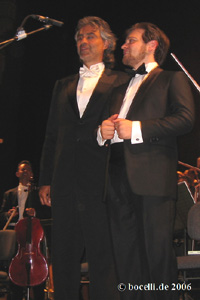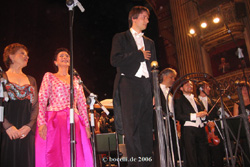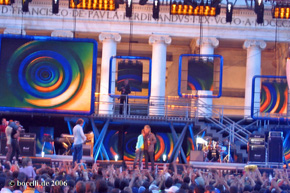- There was one suspended instant in
Rossini’s Petite Messe Solennelle when all else seemed to
fade…when only Andrea seemed to stand before us on the stage of
Teatro di San Carlo, and only his voice—firm and proud—intoned a
single line in the Credo that soared in the perfect acoustics of
that glorious space. In that moment, the thought was clear and
indisputable: "You were born for this—to sing in this way,
secure and beautifully, in this storied place. This belongs to you."
Then the enchanted moment dissolved as the other soloists, chorus,
and orchestra broke the spell and swept the music along in its
course.
-
 At the beginning, in the slight interim between taking the stage
and the sounding of the first notes of the piece, Andrea seemed to
exhibit a bit of tension, noticeable with a repeated testing of
his voice with somewhat startling little bursts of odd sound. The
bass actually did the same…a kind of vocal warm-up. Their faces
were intently serious, and the bass, Mirco Palazzo, looked even a
bit pale. It is easy to disregard the enormity of Andrea’s task
up there, because he takes his place so unassumingly. But seeing
him stand with the other soloists—all but Andrea with musical
score in hand and he alone the one who must commit all to memory
and find his way on his own without visual aid—evoked an
emotional twinge. But he was in good company. Mariella Devia, the
soprano, seemed to be the veteran of the group having sung at most
of the renowned opera houses worldwide. Like Andrea, the mezzo,
Marie-Ange Todorovich, was making her debut at San Carlo. The
"Agnus Dei" that ends the Petite Messe was her
solo, and she sang it with intensely stirring emotion that touched
the audience. We had the opportunity to talk for a while with
Mirco Palazzi, the young bass from Rimini, and his beautiful wife
Rafaella (another couple who met singing opera together). Mirco
was not new to Teatro di San Carlo, but he said it always inspired
a special emotion to take the stage there. He also acknowledged
that this piece of Rossini’s was the most difficult thing he had
attempted to sing and that the roles for both the tenor and the
bass seemed to him to be more challenging than those of the
soprano and mezzo because of the wide range for them between the
highest and the lowest notes. On stage, Mirco, at probably no more
than 5’5", stood in contrast to Andrea’s 6’3"
frame, but what he lacked in size was more than compensated for by
his booming bass voice! He was responsive and attentive to Andrea
throughout both evenings in a very gentle and endearing way.
At the beginning, in the slight interim between taking the stage
and the sounding of the first notes of the piece, Andrea seemed to
exhibit a bit of tension, noticeable with a repeated testing of
his voice with somewhat startling little bursts of odd sound. The
bass actually did the same…a kind of vocal warm-up. Their faces
were intently serious, and the bass, Mirco Palazzo, looked even a
bit pale. It is easy to disregard the enormity of Andrea’s task
up there, because he takes his place so unassumingly. But seeing
him stand with the other soloists—all but Andrea with musical
score in hand and he alone the one who must commit all to memory
and find his way on his own without visual aid—evoked an
emotional twinge. But he was in good company. Mariella Devia, the
soprano, seemed to be the veteran of the group having sung at most
of the renowned opera houses worldwide. Like Andrea, the mezzo,
Marie-Ange Todorovich, was making her debut at San Carlo. The
"Agnus Dei" that ends the Petite Messe was her
solo, and she sang it with intensely stirring emotion that touched
the audience. We had the opportunity to talk for a while with
Mirco Palazzi, the young bass from Rimini, and his beautiful wife
Rafaella (another couple who met singing opera together). Mirco
was not new to Teatro di San Carlo, but he said it always inspired
a special emotion to take the stage there. He also acknowledged
that this piece of Rossini’s was the most difficult thing he had
attempted to sing and that the roles for both the tenor and the
bass seemed to him to be more challenging than those of the
soprano and mezzo because of the wide range for them between the
highest and the lowest notes. On stage, Mirco, at probably no more
than 5’5", stood in contrast to Andrea’s 6’3"
frame, but what he lacked in size was more than compensated for by
his booming bass voice! He was responsive and attentive to Andrea
throughout both evenings in a very gentle and endearing way.
-
- Andrea’s one solo, "Domine
Deus," comes early in the work. The program described it as the
most operatic moment in the piece because of its slancio, or
musical thrust. It definitely claims the spotlight. I found myself
becoming increasingly nervous for Andrea as the moment drew close.
Fortunately, for him, there was the vocal security blanket of
singing his first notes of the evening in quartet to ease into his
highlighted moment. But when the time came, he was perfect. His
voice at once powerful and humbly reverent… conveying both
magisterial triumph and awed deference to his "Lord and God"
in this glorious solo. In fact, glorious is a word that you want to
repeat again and again regarding this music.
-
- The chorus is a real star of the
evening and the one at Teatro di San Carlo was one of the best I
have ever heard. Traditionally, there is no applause granted to any
single musical element throughout a classical piece, but when this
chorus finished a particularly rousing section of the "Cum
Sancto Spiritu," the compulsion to acknowledge it with applause
was simply irresistible. Both nights the crowd gave in to the
instinctive urge to break the rule. Rossini was generous to all the
performers in the Petite Messe. All four soloists have
wonderful parts to sing alone, and there are duets for the soprano
and mezzo and for the tenor and the bass, and also some trios. The
close harmonies are quite beautiful and engaging. The orchestra has
many moments to shine with graceful curlicues of the violins and
violas echoing and answering one another; emphatic, careful
punctuation of notes at several key, dramatic moments; and full
throttle waves of sound the program dubbed "Handelesque
grandiosity." The young German conductor, Michael Guttler,
could have been a Steven Mercurio clone. One of his mentors was
Valery Gergiev. I didn’t think it was possible to duplicate such
overwhelming energy as we have seen from Steven, but Guttler
conjured every ounce of emotion and brilliance that was humanly
possible from the participants with his intensity and command.
Overall, the sum total of this musical tour de force was—you have
to say it again—GLORIOUS—and, by turns, joyful, reverent,
penitential, meditative, and absolutely memorable and emotionally
compelling.

- It certainly had its effect on
Andrea who was in constant movement—knee jiggling, right hand
conducting at what he must have assumed was a discreetly low place
at his side (but was in fact completely visible to all), interacting
sympathetically with the basso with smiles of encouragement,
anticipating the signal of Mirco’s hand on his shoulder for the
four of them to stand in unison (once Andrea seemed concerned that
no signal was forthcoming and he must have felt the moment was
imminent, so he took the lead himself and stood first). I had to
smile that both nights Andrea felt compelled, at almost the same
point midway through the evening, to check the straightness of his
formal white tie. For the first night debut, Andrea was in the
elegant formal tails, and for the second night just a tux. From our
first row vantage point, all of his movements and reactions were
easily observed. A cute moment came toward the end of the second
night, when someone in the audience misjudged the end of the concert
and began to clap enthusiastically out of place, there were the
inevitably stern disciplinary shushes from the crowd, but Andrea
instead smiled broadly and benevolently in response.
-
- Andrea may not have been singing
every moment but his body and soul were engaged completely during
the entire hour and twenty minutes of the performance. He was one
with the music throughout—silently mouthing words with the chorus,
smiling at favored passages. The rhythm of one section of the work—I
think the "Sanctus"—was exactly that of a gallop and it
was easy, watching Andrea, to imagine his mind’s eye figuratively
saddling up, his body shifting instinctively into a steady rocking
movement as if astride his beautiful Arabian stallion. In fact, it
was often hard for anyone in the audience to be still. This music of
Rossini is very accessible. It was clear that Andrea knew the work
intimately from start to finish. Even when singing in quartet or in
duet with the bass, he imposed his own subtle nuances…graceful
pianissimos, lovely legatos, or emphatic intonation of a word here
or there. When he called on his voice for fortissimo, it filled the
hall, loud and clear.
-
- Just a discrete black dot inserted
next to Andrea’s name in the program indicated that this was his
debut at Teatro di San Carlo, but these two concerts marked one more
landmark step for him into the classical world. It must have been a
moment of great satisfaction to stand with his colleagues at the end
of each night and accept the waves of steady applause that seemed to
go on forever and brought them all back to the stage three times.
Many in the audience were on their feet, a true homage in a country
not given to the gesture of a standing ovation.
- The crazy juxtaposition of Andrea’s
two worlds, lyric and pop, was never more evident than the second
night. Teatro di San Carlo is quite literally the proverbial "stone’s
throw" away from Piazza del Plebiscito. The first, with a proud
history of classical music spanning nearly 300 years, is all red
velvet and gold gilt, chandeliered and frescoed, its elaborately
painted domed ceiling rising six tiers, and its gloriously
embellished and copiously curtained royal box is literally fit for a
king. Walking into it is awesome. The second, the Piazza del
Plebiscito, is a gathering place of the people, crossroad of
everyday community life, bordered by historic edifices representing
faith, law, and governance, and with a dramatic glimpse of the
natural backdrop of the Bay of Naples and the distant and distinct
silhouette of Vesuvius. This night the piazza was host to the annual
pop concert known as Festivalbar. Who but Andrea could finish a
landmark concert at Teatro di San Carlo, change from white tie and
tux into blazer and jeans, and rush next door in a 2-minute, madcap
dash with police escort to highlight a line-up of international pop
singers for an estimated crowd of 80,000. Jack and I, miserably
underestimating the time it would take our multitalented tenore
to accomplish this feat, had lingered at the theater, but were
galvanized by his first loudly amplified note into setting a kind of
Olympic land speed record for wheelchair transport to reach a
viewpoint in the piazza where we could hear his "unannounced"
duet with popular Italian singer Gianna Nannini. It seems that
"Ama, Credi, e Vai" might now become the anthem, or l’inno,
of the Italian World Cup soccer team. The crowd that filled every
available space of the Piazza del Plebiscito was one with Andrea as
his voice soared and echoed with the now familiar inspirational
notes. Yet, always the essential gentleman, his innate gentility
would not allow him to overlook the proper cortesia even in
this crazy moment.
-

-
- The story in the Corriere
del Mezzogiorno described it this way:
- "When Andrea Bocelli first
thought of going to sing at the Festivalbar, he had a moment of
hesitation. It would have been improper to abandon ‘il Massimmo
napoletano’ [a reference to the greatest stage of Naples] to
catapult himself into the Piazza del Plebiscito. So he notified the
superintendent of San Carlo to ask his permission. It was a
courteous gesture that Gioacchini Lanza Tomasi appreciated, knowing
full well the dual "pop and operatic" nature of the singer.
It was in this way that Bocelli decided to perform in an unannounced
duet with Gianna Nannini, and present the piece "Ama, Credi, e
Vai," a shout of encouragement for the national soccer team,
about to confront the challenge of the World Cup in Germany."
-
- So, once again Andrea had brought us
to Italy and presented us with a gift of "firsts." The
first trip to Napoli—ancient crossroad of cultures, birthplace of
well-loved Neapolitan melodies; gateway to the brilliant, sun-soaked
Amalfi Coast; creator of pizza Marguerita; and unparalleled producer
of pastry delights like the scallop-shaped, multilayered sfogliatelle
we had enjoyed ogni mattina. The first experience of Teatro
di San Carlo—the awesome feeling of stepping into the almost
sacred space celebrated for its acoustics and beauty, scene of
famous operatic debuts. The pleasure of hearing for the first time
Rossini’s capolavoro of his final years, Petite Messe
Solenelle. And, of course, the final crowning excitement of
sharing with Andrea his first appearance at Teatro di San Carlo. We
ardently hope it will not be the last.
-
- A postscript from Tuscany
-
- We left Naples for Tuscany the day
after the final performance at Teatro di San Carlo. It is a long
haul, but any drive in Italy has its rewards and Jack relishes the
opportunity to drive fast. Too much time had passed since our
last glimpse of this impossibly beautiful countryside, and we had
friends to visit. My thirsty eyes drank in visual gulps of the
beautiful landscape the moment we left the autostrada for the
quieter roads. We also had a mission—a pilgrimage to Lajatico to
check on the progress of Teatro del Silenzio. The little town where
Andrea was born and raised has become familiar to many now. It is in
a quintessential Tuscan setting with vistas of rolling hills
punctuated by the familiar dark-green tall pines, olive groves, and
vineyards. The Teatro site nestles unobtrusively in their midst on
the outskirts of Lajatico, just off the road going out toward
Oriatico. We were able to drive carefully down the crude
construction road to get a feel for what it will be like to sit
there in the midst of the gentle hills and drink in the serene
panorama. Senza dubbio, it was easy to imagine that a concert
there under the stars would be an enchanting experience. I think if
you go, it will not disappoint you!!
-
- Cami McNamee
- June 8, 2006
|

